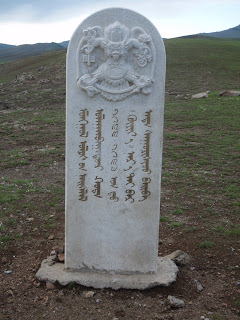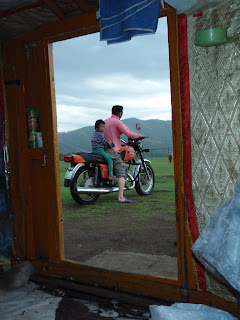Much was made easier for us in Mongolia because a few more people spoke some English. We were able to have some conversations with some folks at some length, like the woman who ran the guesthouse in which we stayed and the man who ran ger-to-ger, so we were able to get a more inside look at the place. Of course, many mysteries remain. I think the very best way to "know" Mongolia at all (barring living there) would be to hire a guide who spoke excellent English and who was well-versed in sociology, history, ecology,etc. and then travel all around and ask her stuff.
We also had the opportunity to be with people in their homes, through ger-to-ger, which is something that we have not done in China. Even though some of that was uncomfortable at the time (how to explain that I just can't eat that much white food: starch and dairy? and how the heck could any visiting vegetarian do it for long?)(and where is the latrine?when you don't see one around and kind of figure they just don't use one)(and, no thank you, I just don't drink vodka) (and we finally learned that the proper answer to what we thought of China was little finger of right hand pointing down [essentially a thumbs down] and of Russia a thumbs up [though given the history of Stalinist purges, who can figure why the Russians would be better thought of than the Chinese, who,granted, have done their share of bad and oppressive stuff whenever they've had the chance])(and what to say to Uranchimeg who finally made herself understood that she wanted to know our opinion of Santa Claus [hers was a definite thumbs up]) Etcetera etcetera...But, in retrospect, what a rich experience!
Perhaps I just didn't make it to Mongolia early enough in my own life. My creature comforts are definitely more important to me than they once were, there are things that I (?)can't tolerate..more like: don't want to tolerate. I'm not proud of this, mind you. We met an Italian man in Ulaan Baatar who was set up to rent a horse and travel, by himself, over territory he knew only by the Russian maps he had downloaded from the internet at home, for 3 weeks. Apparently this was the kind of vacation he usually took..he had crossed into Cambodia through the forest on elephant-back for instance. Didn't look like a big adventurer, looked like an office worker or a school teacher. I told Cal that I had once wanted to do that sort of thing. And then I reconsidered: no, it's more like I want to be the kind of person who does that sort of thing, rather than wanting the on-the-ground, gritty experience of it.
For quite a while now I have romanticized Mongolia...well, no, that's not quite right: more like I've romanticized myself IN Mongolia. There are so many things that appeal to me about the place: the space, the horses and goats, the roving life. But, the actuality of the life that one must live to enjoy those things hit me hard: the cold (not while we were there, of course, but much of the year), the meat diet, the sanitation/hygiene issues (is that really me saying that..well, yes, it is...what a surprise!) So, I'm somewhat humbled by the experience. Anytime the humility quotient gets a boost I figure it's a good thing, even if unwelcome in the moment. So, thank you, Mongolia.
When we first arrived in Mongolia, as you may recall, we were taken aback by the hardness of the place and the people. We got over that. And now that we are back in Beijing, we can compare and contrast. There is a lot of contrast: most populous/least populous. Agriculture/pastoralism. Collective/individual. Something to do with national character? Is there even such a thing?
My book for Mongolia was "Wolf Totem" by Jian Rhong. He is 2 years older than I. So, during the cultural revolution, he was old enough to be sent to the countryside to be "re-educated" and, being from an intellectual Beijing family, off he went. He was sent to Inner Mongolia. It is unclear to me why "inner Mongolia" is now a province of the Chinese nation-state, rather than being still united with the independent Republic of Mongolia, but by the mid-sixties (and probably before...maybe since the 20's?) it has been. He was free to return to central China afterward, but liked the life so much that he stayed and worked as a herder for 10 years. After that, he returned to Beijing, attended university and then worked in academia until his recent retirement. Finally he had the time to write the book that had been gestating for so long. It is fiction, but draws heavily on his autobiography. It has won some big literary awards, but I recommend it more for the picture it creates and the ideas it stimulates than for the writing (which, however, is perfectly fine..in translation, of course), nor for the story (which also is quite adequate).
The picture that he paints is of a cultural clash of the greatest extremity. The grassland that he came to love and the ancient life it engendered is now desert. You've heard of the desertification of northern China? and how storms of yellow dust overwhelm even Beijing from time to time? and how the "mother river" the Yellow River is drying up?...it started in the 60's with the "invasion" of the Han Chinese into the Mongolian grassland, with their huge population, their hunger, their gift for agriculture. It was over-grazed and over-populated and (over)farmed. No respect was paid to the ancient wisdom of the people there regarding the ecological balance that was necessary for the land to continue to provide sustenance to them and all the other creatures that lived there. Great pressure was brought to bear by the central committee that all land be "productive" in ways understood by the Chinese, but inappropriate for the grassland. Heart-rending. (warning: there is a fair amount of other "rending" described in the book: wolves of horses, dogs of wolves, people of marmots, etc. Not for those of tender stomach)
So, I cannot help but look at contemporary situations. The native peoples of the Americas. I will not name the place that is undergoing similar (mis)treatment as we speak, for fear the "filters" will either erase this or worse..but I think you will know whereof I speak. And I muse on this:
*the meaning of the term "indigenous": to me, it means people whose cultural identity is still deeply connected to the land on which their forebears lived and worked and prayed
*cultural identity is an amalgam of material culture (which comes from the environment) and the... how shall we say?..spiritual culture that grows around that.
*when that land is destroyed (or rendered unrecognizable/uninhabitable) or the people driven from it, these people are in the most critical danger of losing that culture identity, since it is OF that environment
*people whose land is gone, and therefore their way of life, are perfect pawns for the military-industrial complex or whatever we choose to call it. They move to the slum outskirts of cities, where their indigenous wisdom has no use and where they do not have the skills/training/education to survive. They are easily plucked for the most menial and often dangerous work (I include prostitution here). They are disrespected for their outsider status.
* we all lose. We cannot stay one jump ahead of the destruction of the natural world for much longer. We need the wisdom of indigenous peoples to survive and to live on the earth in such a way that all it's beings survive too.
So. The "invasion" into Mongolia of big hotel tourism, of mining (with the country itself receiving, at the most, 30% of the gain, and US, or Canadian, or Chinese, or Russian corporations the rest), of agriculture (not, certainly, a bad thing in itself..duh)....of private ownership of the open-to-all space that feeds Mongolians both literally and figuratively will have the same disastrous effect that invasion and occupation by another nation-state can have.
And, there goes the neighborhood.
It saddens me. Is it inevitable, as those who stand most to profit by such things claim? I don't know. Can it be ameliorated? Maybe. How? Damned if I know.
But, I'll keep you posted.
SS
 These lotuses are blooming in 4 pots on the rooftop terrace of our hotel in Beijing.
These lotuses are blooming in 4 pots on the rooftop terrace of our hotel in Beijing. I took these photos the morning of the evening that I found out that the fires that had been threatening my home land and which had been considered 100% contained had kicked up again, carried by strong winds.
I took these photos the morning of the evening that I found out that the fires that had been threatening my home land and which had been considered 100% contained had kicked up again, carried by strong winds. It is unknown at this time whether any of the cabins on our 50 acres still stand. It is unlikely.
It is unknown at this time whether any of the cabins on our 50 acres still stand. It is unlikely. So, we are heading home.
So, we are heading home. The thing about the lotus is that it is this exquisitely beautiful flower that grows out of the mud. Thus the imagery. Even mud can give rise to beauty. Even catastrophe can give rise to...?
The thing about the lotus is that it is this exquisitely beautiful flower that grows out of the mud. Thus the imagery. Even mud can give rise to beauty. Even catastrophe can give rise to...? These lotuses are blooming in 4 pots on the rooftop terrace of our hotel in Beijing.
These lotuses are blooming in 4 pots on the rooftop terrace of our hotel in Beijing. I took these photos the morning of the evening that I found out that the fires that had been threatening my home land and which had been considered 100% contained had kicked up again, carried by strong winds.
I took these photos the morning of the evening that I found out that the fires that had been threatening my home land and which had been considered 100% contained had kicked up again, carried by strong winds. It is unknown at this time whether any of the cabins on our 50 acres still stand. It is unlikely.
It is unknown at this time whether any of the cabins on our 50 acres still stand. It is unlikely. So, we are heading home.
So, we are heading home. The thing about the lotus is that it is this exquisitely beautiful flower that grows out of the mud. Thus the imagery. Even mud can give rise to beauty. Even catastrophe can give rise to...?
The thing about the lotus is that it is this exquisitely beautiful flower that grows out of the mud. Thus the imagery. Even mud can give rise to beauty. Even catastrophe can give rise to...?



































